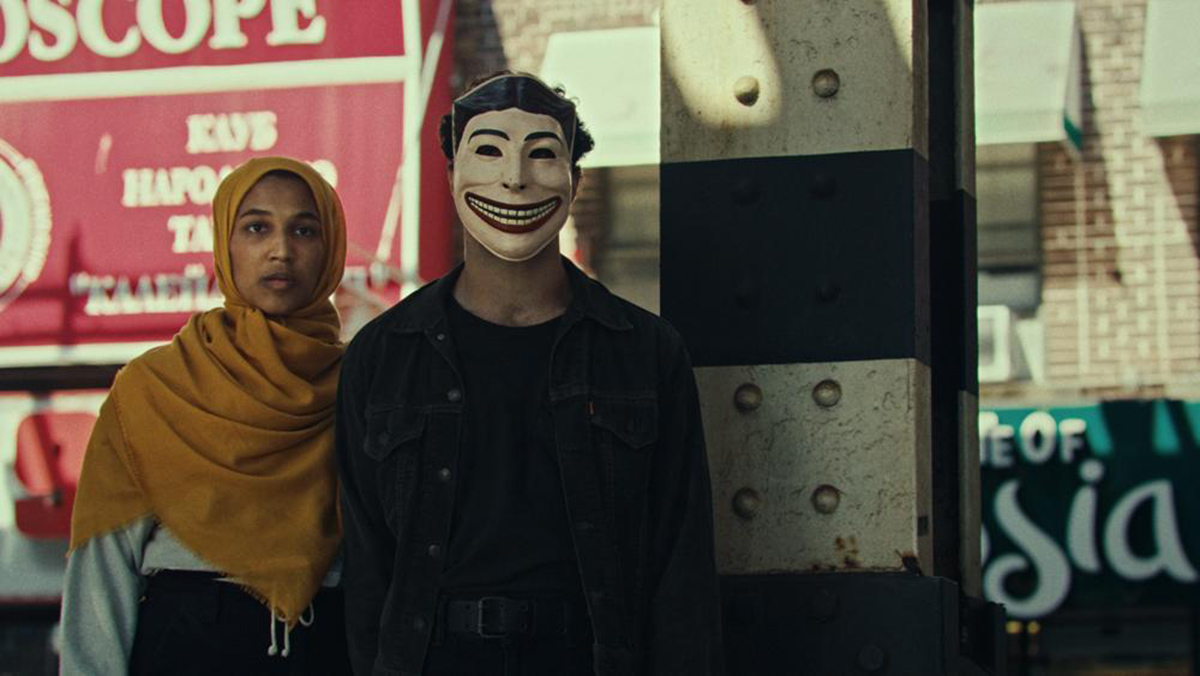In a woozy, unpeopled Brooklyn that feels less like itself than a Benadryl dream of itself, a pair of misfit lovers drive around in a dusty stolen sedan. One wears a mask bearing a grotesquely grinning face, the other a niqab that reveals only her eyes. They seldom speak, and when they do the words come haltingly, questions dangle unanswered. Tim Sutton’s fifth film, which feels like a retreat back into moody abstraction after the moody clarity of “Donnybrook,” will not win him many new fans, and may even alienate some of the old ones, but for anyone attuned to its low-frequency bruised-romance wavelength – one that feels oddly indebted to early ’90s US indie filmmaking – “Funny Face” does exert a strange and singular power. A hypotensive urban fairy tale with not quite enough “tale” to justify the tag, it’s a collection of impressions, in often striking imagery, of a New York borough imagined as a faraway land of rooftops and distant lights and corner bodegas where every day—every moment even—seems to start with “once upon a time.”
READ MORE: 12 Most Anticipated Films Of The 2020 Berlin International Film Festival
The mask – with its horror-movie grin that lands somewhere between The Joker and Momo, by very clear way of the “V for Vendetta” face favored by Anonymous – seems simply to fall out of an empty blue sky. It comes into the possession of Saul (Cosmo Jarvis), a disaffected, slouching loner with a boxer’s nose and a James Dean fixation who lives with his grandparents (Rhea Perlman and Dan Hedaya, whose one scene gives the film a brief crackle of realism). Or at least he used to; their Brooklyn home is being demolished to make way for a parking lot, at the behest of a ruthless property developer, played by a perma-sneering Jonny Lee Miller, to whom we are introduced in a sort of hellish tableau vivant, as he is toasted by a brilliantly obsequious Jeremy Bobb at a private dinner. The developer turns out to be staggeringly broke the way only the staggeringly wealthy can ever be and riven with Daddy issues and expensive, deeply unimaginative sexual habits – any similarity to US presidents past or present is purely coincidental, natch. Elsewhere Zama (appealing newcomer Dela Meskienyar), a young Muslim grieving for her father and chafing against the strictures of her concerned aunt and uncle’s home, sneaks out into the night.
Under the blips and bloops and ticks and tocks of Phil Mossman’s electro-metronome score, the meet-cute happens when Zama is caught trying to shoplift some nuts from the corner store where Saul works and he steps in chivalrously to pay for them instead. They fall hesitantly into step, each asking little of the other, and, in the best tradition of the outcast-lovers-on-the-run genre, becoming all the more bonded as a result of all the companionable, yet slightly edgy silences.
READ MORE: The 25 Best Movies Of 2020 We’ve Already Seen
The film is less of a story than an assemblage of interludes. Some are overliteral to the point of silliness, like a slow pan up from the car in which Saul and Zama canoodle to the neon sign of a bar conveniently named “Nirvana.” Or the deeply unerotic, unnecessarily elongated sex scene in which Miller watches three underwear model-types writhe around in designer lingerie, presumably as an illustration of his venality contrasted with the relative chastity of Zama and Saul’s romance—a fairly prim point to make so salaciously. But, with the endless aid of DP Lucas Gath’s richly saturated imagery, others retains an itchy memorability: Zama revealing the lower half of her face to Saul for the first time, the better to eat her greasy diner pizza; Saul’s sudden impassioned outburst about the Knicks and the Nets, about caring about the things no one else does and feeling, y’know, like you really just gotta do something.
Sutton’s films often make the observation that a socially marginalized, economically struggling young white man looking for a cause is a dangerous thing, and Saul might just be the purest expression of that. In Jarvis’ achy, sympathetic rendering, this stammering manchild is half Holden Caulfield, half B-grade prizefighter from a ’50s noir, a tinderbox of tics and truculence. Based on little more than restlessness, a few overheard phrases of his grandparents, and a very simplistic grasp on the evils of gentrification, Saul has cobbled together a vague but drastic plan of action, and the little tension the film deals in comes in wondering if he will see it through and if the film’s heavy mood of disaster just around the corner will pay off.
“Funny Face” is marked by this portentousness throughout – it’s a quality that is both maddeningly self-serious and curiously self-justifying, as though purely because Sutton is so absolutely certain of the depth in what he’s portraying, one can almost start to believe it’s there, despite a paucity of hard evidence. But then the way things are and the way they seem are very different things in “Funny Face” – a vista of Brooklyn at night can suggest a kingdom, a girl in a hijab can be a sort of Rapunzel, and a discarded mask can be not the Halloween costume of a child but the visor of a knight just searching for the right quest. [B]
Click here for our full coverage of the 2020 Berlin International Film Festival.





